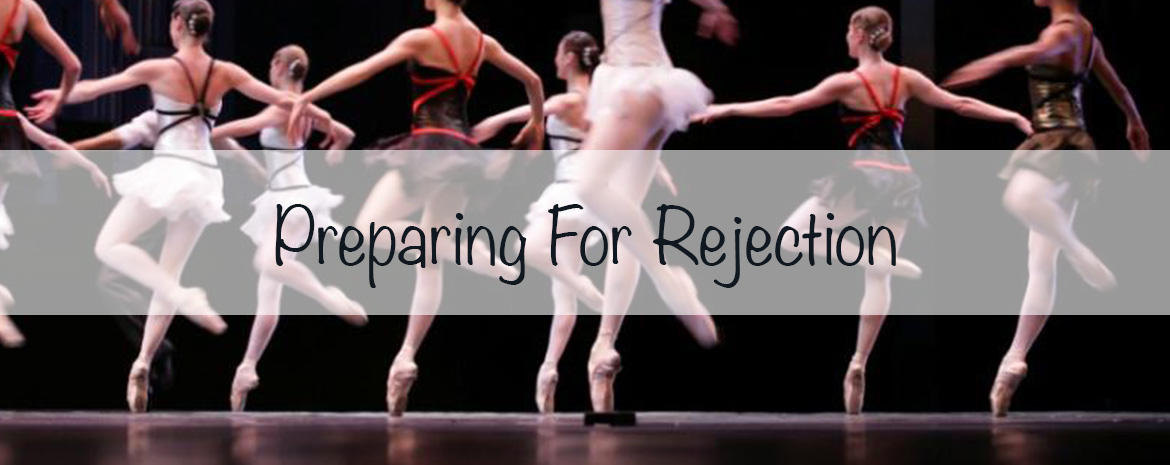I know that dancers have a tough time coping with rejection and dealing with losses at competitions. How can I help my daughter prepare herself so she comes through these situations easily?
Throughout life there will always be competition, failure and rejection. It cannot, and should not be avoided; however there are tools that you can use to help your child deal with the situation - to grow from it, rather than to suffer from it. There is definitely such a thing as healthy competition, however sometimes it can become a little extreme in a teenagers mind.
We live a society that is becoming more and more competitive. There are millions of people with the same dream to become a principal dancer in one of the top companies, and therefore the standard of performance is constantly being pushed higher. Going into a competition, help your daughter to remain calm by talking to her about the following thoughts; “Part of competition is learning how to lose. Be faithful to yourself and hold your poise if things don’t go the way you would like. Winning or losing in a competition doesn’t make you better or worse as a person, but it gives you a chance to learn. Try and understand that the reason you lost is because another person performed better than you did on that particular day. Not because the person is any better than you, or prettier than you, or destined to be wonderful. They just managed to get it all together on the day.” You are not defined by your result at one competition. “Look at what the other dancers are doing and use this as an opportunity to learn. Know that as long as you have the capacity to learn, you have the capacity to improve. Have respect for each other person and be able to congratulate them. Remember that a competition is not just about you. It is a learning experience for all the other girls too. Get your daughter to ask herself some questions;
• What was the other person doing that I am not doing?
• How can I learn from this situation?
• How can I prepare myself next time?
• Do I need to change the way I am doing something?
Having a strong self identity helps enormously with dealing with disappointment. Especially if we have been criticised by an adjudicator, it is important to remember that people are entitled to their opinion, but we do not necessarily have to take it on personally. Teach her how to take the correction, but not as a criticism. Help her understand that even the strongest of us feel a little disappointed at times, yet it is how we deal with this that matters. Disappointment can lead to a point of self destruction if it is left to manifest, so it is essential that she learn how to respond effectively. If we continue to brood on something it can often transform into something much more than the initial incident. A good thing to establish in any competitive situation is where she really feels the competition. Obviously there may be a number of factors present, however usually one is predominant.
• Is it an internal competition, within her own mind, in order to improve her dancing?
• Is it a competition within the family, for example, against an older sibling who has previously been in the same position?
• Is it a competition among friends at the same dance school, each striving to be number one?
• Or perhaps a competition against other students, or other dance schools, in order to save face, or prove that she is better than them. The next thing is to watch her response to “winning” or “losing”. Depending on where the competition of focused, and the personality of the child, this may vary enormously.
• A child may do well in an exam, or win a competition, yet not get as high a mark as their sibling 3 years before, and berate themselves for this.
• Alternatively, a child may come third, yet do their best performance ever, and be completely satisfied with their effort.
• Does “winning” install a sense of stability, a confidence within the child, or fuel an egotistical side of their personality.
• Does the child actually enjoy a ‘win’ or are they already fearful of not living up to it next time?
• Does “losing” encourage them to work more conscientiously towards the next situation, or plunge them into despair that they are “useless, and never going to get it right”?
Now, we all know that it is hard for all parties to stay calm during the highly charged times of hearing the results from any formal competition. However, the calmer you can stay in these times, the better. Try not to put down the other competitors if your child has been “beaten” (however tempting this may be!). Support your child, and focus on the positives of their own performance. Once the emotion of the situation has settled there may be a time for you and the teacher to discuss how the child can work on specific areas to improve their next performance. Try not to do this in a negative way at the time of the performance, as we have all seen some parents doing. “Why didn’t you just smile!?” or “How many times have I told you not to do that?” The highly charged emotions at the time do not really gel with this kind of correction! Simply taking a bit of a step back in any situation can help in seeing it in other ways. If we repeatedly ask ourselves “What went wrong?” our mind will come up with hundreds of reasons why. However if we ask “How can I do better next time?” we will automatically begin thinking of creative ways to improve ourselves!

